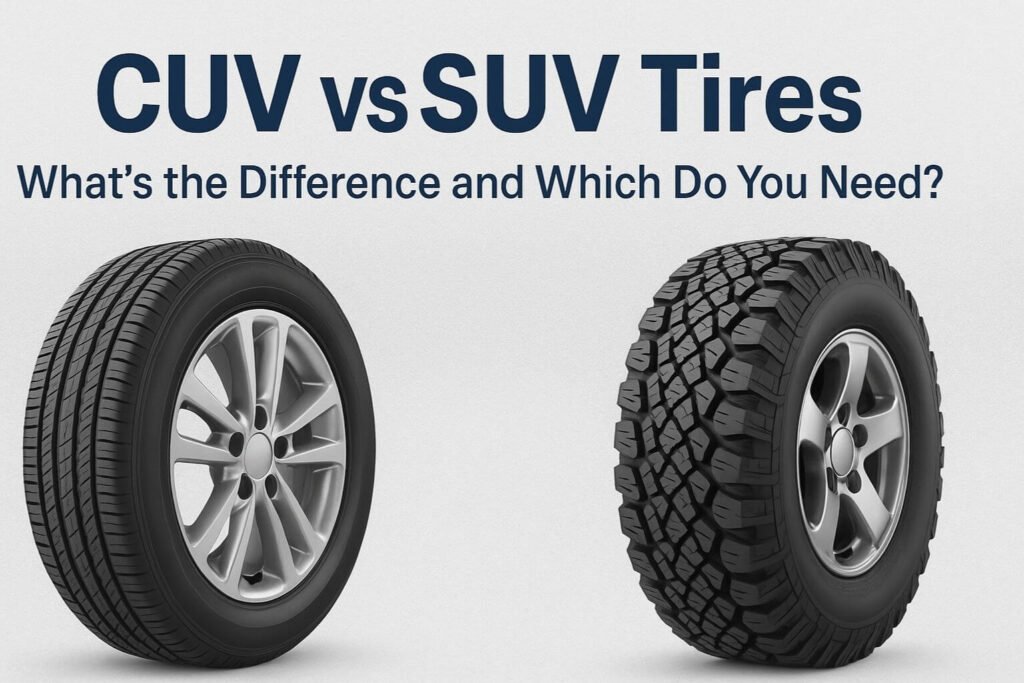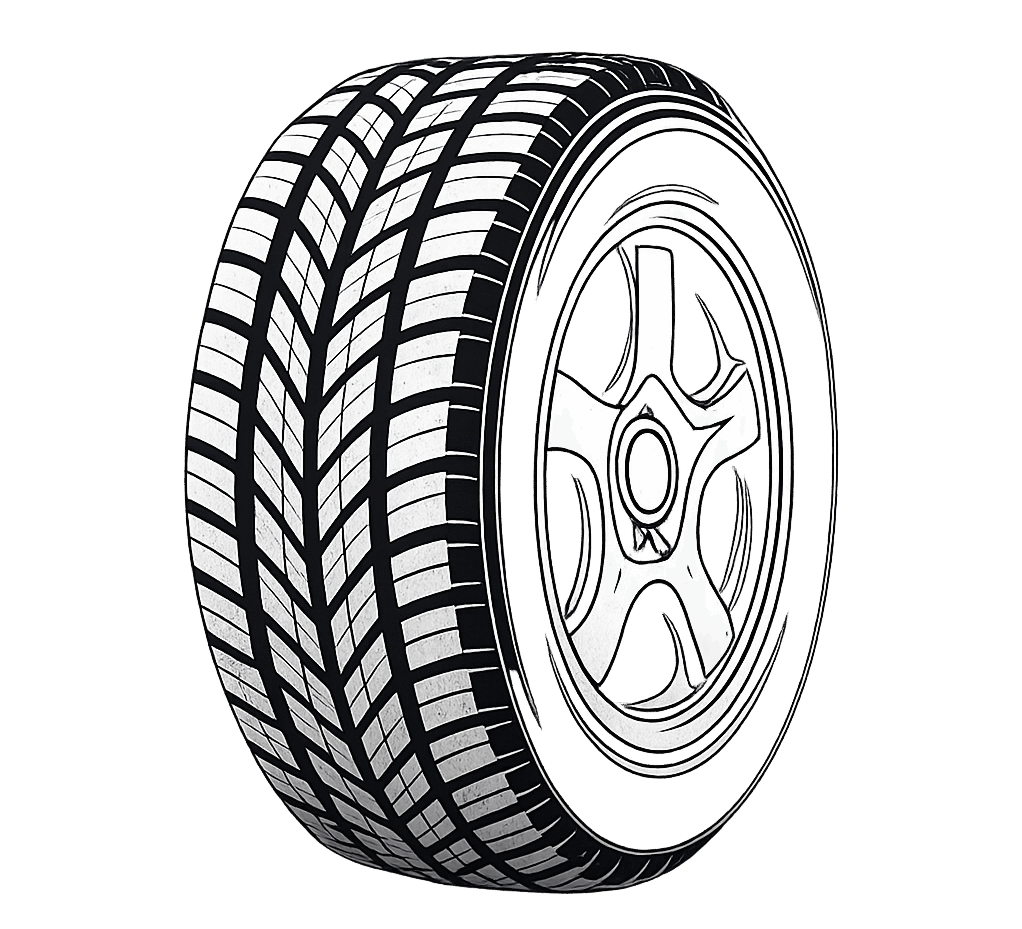CUV vs SUV Tires: Key Differences & How to Choose the Right One
Last updated on August 11th, 2025

If you drive a crossover utility vehicle (CUV) or a sport utility vehicle (SUV), you’ve probably asked yourself this at least once: Do CUVs and SUVs really need different tires?
The short answer is yes—but the real story is far more interesting. While CUVs and SUVs may look similar, they’re built for different purposes, and that affects everything from the vehicle’s weight to how it handles the road. These differences directly influence the type of tire you need for safety, performance, and fuel efficiency.
In this post, we’ll explore the key differences between CUV and SUV tires, why they matter, and how to choose the right set based on your driving habits, climate, and terrain—especially if you’re driving in the U.S. market.
What Are CUVs and SUVs? (And Why Tire Design Matters)
What Is a CUV?
A CUV (Crossover Utility Vehicle) is built on a car-like unibody platform. Think of it as a sedan with a higher ride height and added cargo space. Popular examples include:
- Toyota RAV4
- Honda CR-V
- Subaru Outback
CUVs are typically lighter, offer better fuel economy, and are mostly designed for on-road driving.
What Is an SUV?
An SUV (Sport Utility Vehicle) is traditionally built on a truck-like body-on-frame platform, making it more rugged and capable of handling off-road terrain. Common models include:
- Ford Explorer
- Jeep Grand Cherokee
- Chevrolet Tahoe
SUVs tend to be heavier, more powerful, and are designed for towing, off-roading, or hauling heavy loads.
Why Platform Matters for Tires
Since CUVs and SUVs have different chassis, weights, and performance expectations, tire manufacturers design tires specifically to support each type’s needs.
CUV vs SUV Tires: Key Differences Explained
Let’s break down the essential differences in CUV vs SUV tires, focusing on real-world functionality.
1. Load Rating and Sidewall Strength
- CUV Tires: Designed for lighter vehicles, typically have lower load ratings and softer sidewalls.
- SUV Tires: Built to support more weight and pressure with reinforced sidewalls and higher load ratings.
👉 Example: A CUV like the Subaru Forester may use a tire with a 100H load/speed rating, while a full-size SUV like the Chevy Tahoe might need a 112T-rated tire.
2. Tread Design
- CUV Tires: Tread patterns are optimized for comfort, quiet ride, and fuel economy.
- SUV Tires: Often feature more aggressive tread for better traction on unpaved roads or in adverse conditions.
3. Durability and Off-Road Capability
- CUV Tires: Prioritize road comfort and efficiency; not built for regular off-road use.
- SUV Tires: Built to resist punctures and withstand rugged terrain.
4. Fuel Efficiency
- CUV Tires: Lower rolling resistance improves gas mileage.
- SUV Tires: Heavier and more resistant, usually less efficient on fuel.
Tire Recommendations by Vehicle Type and Use Case
Here’s a quick guide to help you choose the right tires based on your vehicle and how you drive.
| Vehicle Type | Driving Style | Recommended Tire Type | Examples |
| Compact CUV (e.g. Honda HR-V) | City, daily commute | Touring All-Season CUV tires | Michelin Defender T+H |
| Midsize CUV (e.g. Subaru Outback) | Mix of city/highway | All-Weather CUV tires | Continental CrossContact LX25 |
| Full-size SUV (e.g. Ford Expedition) | Towing, road trips | Highway Terrain SUV tires | Goodyear Wrangler Fortitude HT |
| Off-road SUV (e.g. Jeep Wrangler) | Off-roading | All-Terrain or Mud-Terrain SUV tires | BFGoodrich All-Terrain T/A KO2 |
How to Know Which Tire Your Vehicle Needs
1. Check Your Owner’s Manual or Tire Placard
Located inside the driver’s door, your vehicle’s placard lists the recommended tire size, load index, and speed rating. Stick with those specs unless you’ve made modifications.
2. Consider Your Driving Conditions
- Urban commuter? Focus on comfort and efficiency.
- Towing a trailer? Prioritize load capacity and heat resistance.
- Live in snow-prone states like Colorado or Minnesota? All-weather or winter tires might be a better investment.
3. Look for Tires Marked “CUV” or “SUV”
Many brands now label tires specifically for CUVs or SUVs. These designations consider everything from sidewall stiffness to tread compounds tailored to the vehicle type.
Do CUVs and SUVs Ever Use the Same Tires?
In some cases, yes—but it’s not ideal.
Some tire sizes overlap between midsize CUVs and small SUVs. However, the internal structure (ply rating, sidewall reinforcement, etc.) is typically tuned differently. Using SUV tires on a CUV might reduce ride comfort. Using CUV tires on a heavy SUV could be unsafe.
Pro Tip: Always match tires to your vehicle’s weight and purpose, not just the rim size.
Trusted Tire Brands That Offer CUV and SUV Options
Here are some reliable tire brands offering high-quality options for both CUVs and SUVs:
- Michelin – Excellent tread life and comfort (CUV: CrossClimate 2 | SUV: LTX M/S2)
- Continental – Quiet, high-performance all-season options
- Goodyear – Durable SUV tires for all terrains
- Bridgestone – Strong wet-weather performance
- Falken & Toyo – Great for light off-roading and all-terrain SUV needs
FAQs: CUV vs SUV Tires
1. Can I put SUV tires on my CUV?
Not recommended. SUV tires are heavier and stiffer, which can hurt ride quality and fuel efficiency on a CUV.
2. Are all-season tires the same for CUVs and SUVs?
No. Even if labeled “all-season,” CUV and SUV tires differ in load rating and tread design.
3. Are CUV tires cheaper than SUV tires?
Generally, yes. CUV tires are smaller, lighter, and less rugged, which often means lower manufacturing costs.
4. Can I use passenger car tires on a CUV?
Only if they meet the load and speed ratings. However, it’s better to use tires specifically labeled for CUVs.
Conclusion
CUV and SUV tires may look similar at a glance, but under the surface, they serve very different roles. Choosing the right tire isn’t just about fit—it’s about function.
- Driving a light crossover? Go for comfort, quietness, and efficiency.
- Taking your SUV off-road or towing heavy loads? Choose durability and load strength.
Making the right choice ensures safer handling, longer tire life, and a smoother driving experience.
Related Topic:
Light Truck vs SUV Tires: What’s the Difference and Which One Do You Need?
SUV Tires vs Car Tires: What’s the Difference and Which Do You Need?








